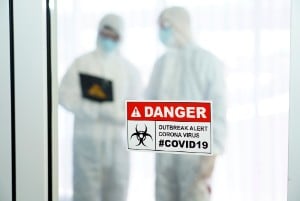Share this
is the U.S. 'remotely prepared' for coronavirus (COVID-19)?
by Neoteryx Microsampling on Mar 30, 2020 2:00:00 PM
 Fear over the recent coronavirus outbreak continues to manifest in extreme ways. Retail stores have run out of hand sanitizers; the stock market has plunged, and healthcare institutions are overwhelmed.
Fear over the recent coronavirus outbreak continues to manifest in extreme ways. Retail stores have run out of hand sanitizers; the stock market has plunged, and healthcare institutions are overwhelmed.
The pandemic echoes the country’s unpreparedness for the disaster. When the U.S. received news of the first person diagnosed with COVID-19, the CDC (Centers for Disease Control) only confirmed positive for the disease the next day after using FedEx to ship the patient’s samples.
This delayed medical testing across the country makes it difficult to determine how widespread the virus is and to respond. The World Health Organization (WHO) emphasized the global risk of coronavirus spreading and its impact was extremely high. So why does the U.S. still seem unprepared despite receiving such a high level of alarm?
Delayed Tests
The U.S. remains behind when it comes to testing people for suspected COVID-19. This is because the CDC decided to create its own testing kit instead of using those recommended by WHO. When the CDC finally managed to develop its testing kits, it sent them to various labs across the country.
However, a problem in the kits made them unusable, leaving only five state health departments (Nebraska, Tennessee, California, Nevada, and Illinois) equipped to test the virus. This limitation has created such a backlog in testing samples that patients need to wait for days to receive results.
While other institutions are working to set up testing facilities, they need to file an application with the FDA and get approval for new testing protocols. Also, scientists must verify and run the existing CDC test to diagnose SARS-CoV-2.
Strict Protocols
According to the CDC, only specific people can take the diagnostic test for COVID-19. Patients must be suspected to have contracted the virus and meet additional criteria, including having a fever. Such strict protocols are restrictive when identifying people who have the disease because mild COVID-19 cases may not present a fever.
Shortage of Health Workers and Need for Training
William Schaffner, a professor of preventive medicine, emphasizes the need for health institutions to re-educate healthcare professionals about respiratory precautions. Little has been done, according to a National Nurses United survey. It revealed 47% of nurses weren’t sure if their hospital had plans to isolate patients suspected of contracting coronavirus. Half weren’t sure if their healthcare institutions had enough protective gear to protect staff from the rapid surge of COVID-19 cases.
Such concerns show the U.S. healthcare system is already strained and would hardly contain an influx of coronavirus patients if it happened. This unpreparedness also puts the country at risk of experiencing acute shortages of healthcare workers.
During the recent COVID-19 case in California, a patient sought help at the UC-Davis Medical Center. Following the patient’s admission, the healthcare facility sent 88 healthcare workers and 36 registered nurses home to self-quarantine.
High Cost of Medical Care
Expensive medical care may deter people from getting tested in the face of this calamity. Some states like New York have ordered state insurers to avoid charging patients for coronavirus testing, but more needs to be done.
The CDC has outlined preventive measures such as staying home when ill. But federal law doesn’t have a provision that requires all employers to pay sick leaves. As a result, employees go to work even when they are sick, which can cause a manageable health crisis to become uncontrollable.
How to Curb the Menace
Leveraging remote sampling will reduce delays in testing samples. Volumetric absorptive microsampling tools like Mitra devices allow researchers to collect research samples remotely. It uses microsampling to yield consistent results comparable to standard phlebotomy.
The microsamples are stable for 21 days at room temperature and 2-5 days at ambient temperatures. This eliminates issues occurring during transportation of samples for testing. It explains why VAMS devices like Mitra may play a critical role in coronavirus applications.
Follow Public Health Recommendations
The public needs to be proactive in preventing the disease from spreading by keeping healthy. Following these health recommendations is one effective way to keep coronavirus at bay. They include:
- Calling your doctor before leaving home to reduce the number of people exposed
- Covering your mouth when coughing
- Reducing face-touching
- Staying at home if you feel sick
- Using hand sanitizer frequently
- Using traditional flu remedies (fever-reducing medication, cough syrup, drinking plenty of liquids) when sick
- Washing your hands with soap and water
The US National Institutes of Health (NIH), other governmental institutes, many universities and qualified labs are using our at-home Mitra® Collection Kits to study COVID-19 antibodies. We are rapidly producing Mitra kits to support your work in fighting this pandemic. Access the resources to help you learn more below!

Share this
- Microsampling (206)
- Research, Remote Research (119)
- Venipuncture Alternative (105)
- Clinical Trials, Clinical Research (83)
- Mitra® Device (73)
- Therapeutic Drug Monitoring, TDM (51)
- Dried Blood Spot, DBS (39)
- Biomonitoring, Health, Wellness (30)
- Infectious Disease, Vaccines, COVID-19 (24)
- Blood Microsampling, Serology (23)
- Omics, Multi-Omics (21)
- Decentralized Clinical Trial (DCT) (20)
- Specimen Collection (18)
- Toxicology, Doping, Drug/Alcohol Monitoring, PEth (17)
- Skin Microsampling, Microbiopsy (14)
- hemaPEN® Device (13)
- Preclinical Research, Animal Studies (12)
- Pharmaceuticals, Drug Development (9)
- Harpera Device (7)
- Industry News, Microsampling News (5)
- Antibodies, MAbs (3)
- Company Press Release, Product Press Release (3)
- Environmental Toxins, Exposures (1)
- July 2025 (1)
- May 2025 (1)
- April 2025 (2)
- December 2024 (2)
- November 2024 (1)
- October 2024 (3)
- September 2024 (1)
- June 2024 (1)
- May 2024 (1)
- April 2024 (4)
- March 2024 (1)
- February 2024 (2)
- January 2024 (4)
- December 2023 (3)
- November 2023 (3)
- October 2023 (3)
- September 2023 (3)
- July 2023 (3)
- June 2023 (2)
- April 2023 (2)
- March 2023 (2)
- February 2023 (2)
- January 2023 (3)
- December 2022 (2)
- November 2022 (3)
- October 2022 (4)
- September 2022 (3)
- August 2022 (5)
- July 2022 (2)
- June 2022 (2)
- May 2022 (4)
- April 2022 (3)
- March 2022 (3)
- February 2022 (4)
- January 2022 (5)
- December 2021 (3)
- November 2021 (5)
- October 2021 (3)
- September 2021 (3)
- August 2021 (4)
- July 2021 (4)
- June 2021 (4)
- May 2021 (4)
- April 2021 (3)
- March 2021 (5)
- February 2021 (4)
- January 2021 (4)
- December 2020 (3)
- November 2020 (5)
- October 2020 (4)
- September 2020 (3)
- August 2020 (3)
- July 2020 (6)
- June 2020 (4)
- May 2020 (4)
- April 2020 (3)
- March 2020 (6)
- February 2020 (3)
- January 2020 (4)
- December 2019 (5)
- November 2019 (4)
- October 2019 (2)
- September 2019 (4)
- August 2019 (4)
- July 2019 (3)
- June 2019 (7)
- May 2019 (6)
- April 2019 (5)
- March 2019 (6)
- February 2019 (5)
- January 2019 (8)
- December 2018 (3)
- November 2018 (4)
- October 2018 (7)
- September 2018 (6)
- August 2018 (5)
- July 2018 (8)
- June 2018 (6)
- May 2018 (5)
- April 2018 (6)
- March 2018 (4)
- February 2018 (6)
- January 2018 (4)
- December 2017 (2)
- November 2017 (3)
- October 2017 (2)
- September 2017 (4)
- August 2017 (2)
- July 2017 (4)
- June 2017 (5)
- May 2017 (6)
- April 2017 (6)
- March 2017 (5)
- February 2017 (4)
- January 2017 (1)
- July 2016 (3)
- May 2016 (1)
- April 2016 (2)


No Comments Yet
Let us know what you think